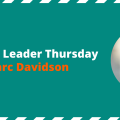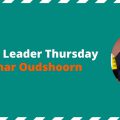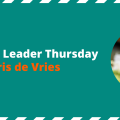
Thought Leader Thursday | Marc van den Tweel – Natuurmonumenten: “From feeling down to euphoria”
In the interview series Thought Leader Thursday Every Thursday we speak to an expert in the field of a specific issue. While the corona crisis shook up the entire society, we are curious about what consequences this has had on issue management and making these Thought Leaders.
This week we talked to Marc van den Tweel, general director of Natuurmonumenten. He is also a member of the Supervisory Board of the National Museum of Antiquities and chairman of the Program Committee of Civil Power. We spoke to him about Dutch nature, an issue that came under both positive and negative pressure during the crisis.
What were the expectations regarding your issue before the corona crisis started?
“At Natuurmonumenten we actually have a dual approach. On the one hand, we are a manager of nature and we try to manage 109,000 hectares in the Netherlands and 3,600 cultural-historical buildings as best as possible. At the same time, we try to let as many people as possible enjoy it. That is a management and development operation. In that sense we are also very different from most other NGOs. They are mainly concerned with campaigning and bringing ideas to light. And at the same time we do that too, so you could say we are really atypical. We do the latter mainly because we see that we can take good care of our nature reserves, but that there are also external factors such as desiccation, water management systems, nitrogen, climate change, etc., that can make our management work more difficult. So we can do our best, but if nothing happens with those external factors, you lose control over those negative developments. These political themes have become more influential over the past six months and we also see this in our public affairs policy, where entering into alliances, for example, has become much more important.”
What happened to the issue during the crisis?
“We saw some strange things in the first period. We employ 750 people and 12,000 volunteers, a large club that suddenly has to work in a different way, taking into account very strict safety protocols. This is a major logistical operation for the hundreds of people we have working outside. Our visitor centres, offices and shops closed, as did the real estate we rent to catering companies. Membership recruitment, which is an important part of our activities, also came to a standstill. These were therefore very difficult months, also financially. That really made quite a difference.
At the same time, there was also a renewed interest in nature close to home, even from people who traditionally do not or much less often spend time in Dutch nature. That also caused a few operational problems. Natural areas were sometimes overrun with enormous amounts of people. Suddenly we had to close off areas and we had never done that before in our history. Naturally, we are very happy with this renewed interest and appreciation and we have actually started campaigning on this. The 'Greetings from the Netherlands' campaign is a bit of a nod to the fact that people no longer went on holiday to Italy, but to the Achterhoek. This has resulted in a huge influx of members and donations in the past two months.
So we saw strange, erratic patterns: from being depressed to euphoria.”
What is the current status of the issue?
“It is difficult to keep the focus on political themes and external factors. Informal contacts no longer take place. Public affairs is also partly about building relationships: you have facts, figures, arguments that all have to be clear and good, but of course it is also about having contact and building a bond. And that is becoming a complicated game. That doesn't matter for a while, but in the long term it is difficult.
In addition, we see that corona has also sucked some of the attention away from other issues: they are all on hold. I understand that, but it has not made those themes any less topical.
I hope that the renewed appreciation for Dutch nature will have a positive impact on these themes. We are working hard to draw attention to this. However, the question is whether now is the time for a fundamental change. History shows that something always changes after crises, but rarely is it a huge, drastic change. After the crisis in 2008 it was also said: “now the entire financial system is changing” but that has not been substantially adjusted. This crisis is an evolutionary process that opens your eyes to new insights, but partly we also long for everything to remain the same. That sounds a bit strange, but it is of course wonderful to be able to get on the road again and do the things you did before.
A crisis is also a moment of self-reflection: what have I learned from this period, what will I do differently from now on? It is also a good time for society to reflect on what we collectively want/can do differently. In that sense it is also an opportunity, for example to make investments where they have the best social and/or economic return.”
What are you going to do with the issue in the near future?
“I hope that the revaluation of Dutch nature will be permanent and that we will take our collective responsibility better in the field of spatial planning, nitrogen and climate. I hope that we can really take steps in this regard and we will try to do our part.
For us, the elections and cabinet formation are an important benchmark for the coming years. We will therefore try to be in the sphere of influence there. The election program committees are actually mainly concerned with corona, or parties have not yet produced any programs at all. I therefore find it difficult to look ahead, especially because as a society we now live in the moment.
Fortunately, we see that many new target groups have come to us who were traditionally less concerned with nature. We now try to properly inform, involve and excite them with very clear communication. We have a total of 600,000 followers on our social media channels. We try to maintain this influx of new people, for example through 'Thinking of Holland' on television. Those areas that André van Duin sails through are often visited by people who would never have come up with that idea themselves. We are really trying to accelerate on that now.
The paradox is that on the one hand there is more interest than ever in our nature reserves, but on the other hand it is more difficult to bring this to the attention of decision makers due to corona. Let's hope that we get through these coming weeks well, so that people can continue to come to our 'showroom'. Ultimately, she has to see it for herself.”


